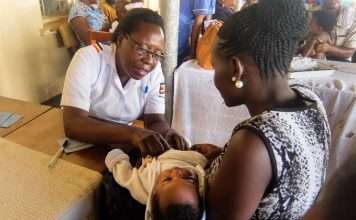According to UNICEF, the number of unvaccinated children in Lagos State has reached a record high of 190,000, with Ogun State following closely with around 130,000.
Lack of awareness, limited access to immunisation services, and vaccine hesitancy are cited as key factors contributing to the high number of children not receiving any vaccines in Nigeria.
The global body reports that approximately 2.2 million children in Nigeria do not receive any vaccines annually, making the country one of the top countries with the highest number of unvaccinated children worldwide.
UNICEF Health Specialist, Dr Ijeoma Agbo, emphasized these concerns during the observance of World Immunisation Week, which aims to promote the use of vaccines to protect people of all ages from disease.
The theme for this year’s World Immunisation Week is ‘Humanly Possible: Saving Lives through Immunisation’, commemorating 50 years of the Expanded Programme on Immunisation and recognizing the collaborative efforts to prevent vaccine-preventable diseases and improve public health.
Agbo stressed the urgent need to address the issue of unvaccinated children in Nigeria.
She mentioned, “We are still seeing these pockets of unvaccinated children despite all the efforts that have been made.
“We have seen that some of the challenges remain the lack of awareness and knowledge.
“We have unvaccinated children that account for about 2.2 million in Nigeria and particularly in certain states like Lagos and Kano, just based on our population.”
She pinpointed that Lagos, Kano, and Sokoto states are among the states that have the highest numbers of unvaccinated children in the country.
Agbo who covers the south-west geo-political zone made up of Lagos, Oyo, Ogun, Ondo, Osun, and Ekiti states, stated, “Within the south-west states, Lagos is leading in terms of having the highest number of unvaccinated children.
“As of last year, we had over 190,000 unvaccinated children followed by Ogun State with 130,000 unvaccinated children.”
The UNICEF health specialist observed that while some people understand the importance of immunisation, they may not be fully aware of the specific ages at which children should be vaccinated. This lack of knowledge can lead to missed opportunities for immunisation and may put children at risk for preventable diseases.
The specialist emphasized the need for education and awareness campaigns to ensure that parents and caregivers have the information they need to keep their children healthy.
“Some don’t understand the importance of it and even when you speak to some caregivers, they don’t even know how to go about it and where to get it from. So, we have seen that knowledge and awareness is still a major problem.
“Another problem that we have seen is in terms of access. Poverty is a big problem that we know is still rampant in Nigeria.
“For some, even the finance to access the health facilities where they will get these vaccines is still a huge problem, especially in our hard-to-reach areas, conflict areas. That has been a major issue in terms of accessing these immunisation services”, she mentioned.
The health expert further stated myths and misconceptions around vaccines, especially among people in rural areas, also contribute to the burden of unvaccinated children in the country.
Agbo restated , “Another problem that we have seen and we saw it quite rampant during the HPV vaccine introduction is vaccine hesitancy. It is a big challenge that has cropped up.
“We are trying to see how we can collectively bring that down. Vaccine hesitancy is a problem because people don’t have trust in the vaccine. There are a lot of myths and misconceptions about vaccination.
“I want to say that those are the three major issues that have contributed to the high numbers of unvaccinated children within the country and our various states.”
Agbo, speaking at this year’s immunization week, emphasized the critical role that vaccines play in disease prevention. He noted that vaccines are one of the most effective and proven public health interventions, preventing millions of deaths and illnesses each year.
He underscored the importance of collaboration between government, community and religious leaders, healthcare providers, and media organizations to increase awareness about the importance of immunisation, especially for children in vulnerable populations.
He urged these stakeholders to work together to ensure that all children have access to life-saving vaccines and that no child is left behind in receiving the protection they need.
“It is the only single public health intervention that has been seen to prevent diseases. So, we want to focus on that and continue to raise awareness about vaccination.”
She pinpointed that this year’s commemoration is quite strategic, citing the achievements made in the last 50 years in saving the lives of millions of people from vaccine-preventable diseases through immunisation.
“This year in particular is quite strategic because of the theme – Humanly Possible: Saving lives through immunisation. And if you look at when we had the expanded programme on immunisation, it is exactly 50 years ago. It just showcases the triumphs and achievements that we have made in the last 50 years.
“So in 50 years alone, we have saved over 450 million lives just with vaccination, and that translates to one every 10 seconds, which is a huge improvement.
“In these 50 years, we have eradicated smallpox. We have almost eradicated polio. We only have two countries that still have the wild polio virus’ ‘, she stated.
Agbo highlighted the significant impact that vaccination has had on child mortality rates, stating that many more children are now reaching the age of five because they are being protected against vaccine-preventable diseases.
He urged governments to increase investment in immunisation services, emphasizing that much work remains to be done in order to ensure that all children have access to these essential services.
Additional funding and resources are essential, he said, not only to procure vaccines, but also to transport them to the communities where they are needed most.
